Concussions and CTE What You Need to Know 6 Part Series Part 5…Get Part 1 Here
DHA And EPA
These are omega-3 fatty acids found in fish. They are also available in supplements form and chemically, they are polyunsaturated fatty acids. These fatty acids are an important structural component of cellular membranes and maintain their fluidity. Being involved in structural integrity of plasma membranes, they can be helpful in the healing process of a concussion. They are also anti-inflammatory in nature and control secretion of many mediators. This property has shown benefits in limiting the inflammation after a concussion.
Many studies have shown promising results and scientists expect that these fish oils can be used to boost the recovery process. They also ease the oxidative burden and cardioprotective in nature. These polyunsaturated fats also mediate the coordination in brain and memory latency. Their neuroprotective nature limits the damage done by a concussion and alleviates inflammation.
Foods rich in omega-3 fatty acids include:
- Fish oil
- Cod oil
- Seafood
- Fish
What does the research say?
So far there have been no human studies examining the role of EPA/DHA in providing increased resilience to TBIs. Although there have been clinical studies and trials which present many positive effects of EPA/DHA on other neurological diseases, such as epilepsy and strokes.
Effects Of Pre-Injury Supplementation (AKA Prevention)
There have been some animal studies regarding the resilience to TBIs following the administration of essential fatty acids. A series of trials done on Animals done in 2004 and 2007 showed that the preinjury intake of a fatty acid-enriched diet could counteract some of the harmful effects done by TBIs. The pre-injury intake of EPA and DHA has been linked with the normalizing of levels of the molecular systems related to energy homeostasis as well as improving learning ability. The results from these studies have suggested that there are potential neuroprotective effects of EPA/DHA on TBIs.
“A series of trials done on Animals done in 2004 and 2007 showed that the preinjury intake of a fatty acid-enriched diet could counteract some of the harmful effects done by TBIs.”
Wu et al. 2007 studied the effects of omega fatty acid supplementation on clinical outcomes in rat models of TBI. The rats were divided into the fatty acid or placebo group and were given their respective diets for a period of 4 months. After the induction of brain injury, the fatty acid group of rats showed significantly reduced expression of abnormal brain proteins following brain injury compared to the placebo group.
“After the induction of brain injury, the fatty acid group of rats showed significantly reduced expression of abnormal brain proteins following brain injury compared to the placebo group.”
In another study, Wu et al. 2004 studied the effects of omega-fatty acid supplementation on the functional capacity of animal models of TBI. The rats were divided into fatty acid or placebo groups and were given their respective diets for a period of 4 weeks before the induction of traumatic brain insult.
After the induction of insult, the functional capacity of the rats was judged using the Moris water maze. The rats fed with omega fatty acid based diet showed amazingly well compared to the placebo group. Moreover, the fatty acid group of rats had significantly lower levels of brain degrading proteins, the levels of which raise following an injury.
“The rats fed with omega fatty acid based diet showed amazingly well compared to the placebo group.”
Post-Injury Trials (AKA Recovery)
A study was done in 2010 using 40 adult male Sprague-Dawley rats. The rats were divided into four groups. Two of these groups received dietary supplementation of Omega-3 fatty acids at a dosage of 10 or 40 mg/ kg a day. The trial was started one day after the injury was implemented. Results showed that 30 days post-injury the Omega-3 fatty acids in the injured specimens significantly reduced the number of beta- amyloid precursor protein- positive axons, achieving levels like those in uninjured animals.
“Results showed that 30 days post-injury the Omega-3 fatty acids in the injured specimens significantly reduced the number of beta- amyloid precursor protein- positive axons, achieving levels like those in uninjured animals.”
Zinc
Zinc is a micronutrient known for its role in cell growth and development. It also acts as a cofactor for many enzymes. Just like magnesium, zinc levels also drain just after a concussion and stay decreased for a significant number of days. To increase these levels, dietary supplementation of zinc is recommended.
It helps in the repair process by developing new cells in your brain. It takes away the impact of mechanical injury by alleviating inflammation and helps in restoring metabolic pathways. Zinc may be a micronutrient but its functions in the brain are crucial ones. It is released in the synaptic cleft, which makes a connection between two neurons. It’s responsible for effective communication between neuron. Due to axonal damage in a concussion, there are healthy chances that patterns of communication change and brain will suffer a lack of coordination. To preserve this and limit the inflammatory damage, zinc levels need to be maintained.
Foods rich in zinc include:
- Yogurt
- Chickpeas
- Kefir
- Pumpkin seeds
- Cocoa powder
- Almonds
- Cashew nuts
What does the research say?
Clinical studies have shown that following a head injury, patients are at a risk for the development of zinc deficiency. Patients with traumatic brain injuries have increased urinary zinc loss that ends up persisting for weeks after the injury occurs. This results in reduced serum zinc levels. Studies have established that the patients who were injured the most severely had an average of urinary zinc levels which were 14 times higher than the standard values.
Due to the findings of that specific clinical trial, a rat model was used with a combination of moderate zinc deficiency and brain injury to critically examine the results of zinc deficiency after a TBI. Zinc deficiency showed increased cell death at the site of the injury compared to zinc adequate controls. It was measured using TUNEL labeling. The animal model showed both apoptotic and necrotic cell death for 4 weeks following the injury. The results of the study made it safe to say that the supplementation of Zinc would be highly beneficial to any patient suffering a TBI.
“The results of the study made it safe to say that the supplementation of Zinc would be highly beneficial to any patient suffering a TBI.”
This study led to the hypotheses that zinc deficiency and the increase in cell death has a huge role to play in the behavioral deficits after a TBI. This hypothesis was tested by feeding rats a diet which included marginal levels of Zinc for a period of 4 weeks. The rats then received a moderately severe bilateral TBI. The TBI was implemented using a controlled cortical impact to their frontal cortex. This specific model induces edema which becomes relevant in the first hours after the injury using magnetic resonance imaging. The zinc deficiency in the rats led the edema to dissipate and resulted in neuronal damage.
In 1996 a clinical trial was designed to test whether the zinc supplementation would provide an efficient improvement in the treatment of TBIs. The hypothesis was tested by assigning 68 patients to either a zinc- adequate group or a zinc supplemented group. The group which was to be administrated an adequate amount of zinc would be given 2.5 mg per day. The zinc supplemented group was to receive 12 mg daily. The Zinc was to be administered intravenously as zinc sulfate within 72 hours of the injury. The trial was held for a period of 15 days. The treatment was given in conjunction with total parental nutrition.
After the starting period of total parental nutrition, patients were initially given 22 mg of zinc a day or were placed on the placebo treatment for a period of three months. Results showed that after about 3 weeks, retinal-binding proteins were significantly increased in the patients receiving supplemented Zinc. One month into the trial the mortality rate in the adequate control group was 26 percent. The Supplemented control group only had a mortality rate of 12 percent. The results of the clinical trial proved that the supplementation of zinc may improve the rate of survival. Along with the decrease in the mortality rate, the zinc supplemented group showed improvement in their Glasgow Coma Scale (GCS) scores. These improvements were seen within two weeks of the trial.
“One month into the trial the mortality rate in the adequate control group was 26 percent. The Supplemented control group only had a mortality rate of 12 percent.”
Studies Showing Resilience To TBI (AKA Prevention)
A study was initiated to test whether zinc supplementation results in improving resilience to TBIs. The study consisted of adult male rats which were either given a zinc -supplemented diet or a zinc- adequate diet. The rats were randomly divided among the two groups. The trial took place over 4 weeks.
After the 4 weeks concluded, the test subjects were implemented with a severe TBI, which was induced by a controlled cortical impact. The rats which were supplemented with a significant amount of Zinc showed reductions in depression- like behavior and presented reduced stress and anxiety post-injury. The Zinc supplementation showed a notable improvement in cognitive behavior. The Zinc in their diet prevented many deficits such as; impaired spatial learning and memory. As a matter of fact, during a 10 Morris water maze testing period, the zinc supplemented rats showed no difference in learning and memory than the test rats that were left uninjured.
“…the zinc supplemented rats showed no difference in learning and memory than the test rats that were left uninjured.”
Polyphenols
Among a plethora of problems emerging after a concussion, ischemia is a nasty one. Due to low levels of cerebral blood flow and metabolic changes, the supply of oxygen is cut off. Ischemia ensues, powerfully overcoming the brain and causing a lot of damage. The vascular problems and mechanical damage to arteries of the brain also contribute in exacerbating ischemia. Ischemia triggers inflammation as well. Research has shown that polyphenols, present in grapes and red wine, have a protective role in ischemic stroke and other pathological problems constituting ischemia. This has made polyphenols an important dietary constituent to be supplemented after a concussion.
“Research has shown that polyphenols, present in grapes and red wine, have a protective role in ischemic stroke and other pathological problems constituting ischemia.”
Polyphenols also decrease the secretion of inflammatory mediators and reduce swelling. Your body contains enzymes like superoxide dismutase that are responsible for limiting the number of reactive species in your body. After a concussion, the levels of this enzyme decrease, especially in the brain. That contributes to the increase in oxidative burden and its respective damage to cellular membranes. Polyphenols increase the levels of these enzymes and alleviate the free radical burden. They also directly neutralize these ions and limit their impact.
Another major role played by polyphenols in the recovery process of concussion is the production of nitric oxide. The NO is a vasodilator that acts on your blood vessels and dilates them. This brings about a vascular homeostasis and helps in balancing blood flow. The circulation boosts immensely and provides an adequate amount of nutrients to the site of injury, which otherwise is halted due to reduced blood flow. These dilate vessels also alleviate ischemia and a limited supply of glucose. Due to correction in substrate limitation of glucose, glycolysis restores, and energy recession starts getting better.
Considering their effects as anti-aging constituents they have proven to be highly beneficial in improving memory and cognition. Polyphenols have shown promising results in reducing effects of aging on memory and brain function. They improve your learning, preserve memory and boost cognition. They are generally neuroprotective in nature and maintain the structural and functional integrity of your brain.
In short, polyphenols are multi-purpose nutrients and take care of wide range of effects of concussions. They also protect your cardiovascular system and brain health in general. They act as best anti-aging potions and keep you healthy and young! What else do you need when you have miracle nutrients in the form of polyphenols?
“In short, polyphenols are multi-purpose nutrients and take care of wide range of effects of concussions.”
They are found in plenty of fruits and vegetables but some are particularly abundant in polyphenols. They include:
- Cinnamon
- Red wine
- Blackberries
- Green tea
- Walnuts
- Coffee
What does the research say?
A number of clinical trials have assessed the link between polyphenol supplementation and TBI risk and outcomes. Some of these research studies have been summarized as follows:
Vitamin D
Vitamin D helps in recovering from post-traumatic stress disorder (PTSD), one of the common complications of a concussion. Other than these, post-concussive symptoms like irritability, dizziness, mood instability and behavioral changes can prolong up to a year. These chronic problems can lead to depression and other neurological problems. However, vitamin D can help in limiting this damage. It alleviates PTSD and depression and restores the chemical balance of your brain. Studies have shown that vitamin D is involved in reducing the risk of suicide and depression in people who have suffered multiple head injuries. Military personnel are particularly vulnerable to PTSD following a concussion and for them, vitamin D supplementation is even more crucial. It also helps in shortening the time span of post-concussive symptoms.
“Vitamin D helps in recovering from post-traumatic stress disorder (PTSD), one of the common complications of a concussion.”
Vitamin D also shortens the duration of inflammation. Although inflammatory mediators help in tissue repair but an excess is damaging to cellular membranes. Vitamin D limits the inflammatory mediators in the body and helps winding it up as soon as possible. Neurotoxicity is another possibility after concussion and vitamin D also takes care of it. The majority of our population is deficient in vitamin D and this poses a threat to the health of people who have suffered repetitive concussions. To reduce the incidence of these complications, it’s recommended to supplement your diet with vitamin D. The healing phase of head injury benefits a lot from vitamin D and speeds up the process.
Vitamin D is very easy to obtain. It’s in the sunlight and you can bathe yourself in it while getting a nice tan. However, after a concussion, exercise or outdoor activities are usually limited as the patient is dizzy, you need to take it in the form of diet. Foods rich in vitamin D are:
- Cheese
- Soy milk
- Egg yolk
- Tuna
- Salmon
- Raw milk
- Fish oils
- Liver
- Meat
What does the research say?
Along with progesterone, sufficient vitamin D nutrition before any potential TBI may be critical for any treatment following the injury. A study based in 2009 tested the possibility of Vitamin D creating resilience to TBIs. The study was conducted using aged rats. The rats in the trial which were well supplied with Vitamin D showed a reduction of 50% in locomotor activity following the injury.
Vitamin B complex
Vitamin B complex is a family of vitamins with each member securing a role in your body. This complex becomes even more important after a concussion because it’s involved in brain development and tissue repair. B complex has a crucial role in metabolic processes. So, after a concussion when your metabolism is stagnant, B complex brings it to life and refreshes your energy stores. These vitamins are also active cofactors for many enzymes taking part in the metabolism of your body. They activate these enzymes and put them to work. Your metabolic machinery resumes working again.
A concussion causes axonal injury leading to instability in cellular structures. Vitamin B complex helps in rebuilding these cellular structures and also provides antioxidant support.
You can take them as supplements or in the form of diet. They all coexist in various food materials but some are in higher amounts in particular foods. Foods rich in various B-complex vitamins are as follows:
What does the research say?
Creatine
Creatine- An Overview
Creatine is an amino acid-like substance that is naturally produced in your body. The amino acids involved in its biosynthesis include arginine, methionine, and glycine. It is mainly synthesized in the parts of the body including pancreas, liver, brain, and kidney.
You can get creatine from dietary sources as well. The major dietary sources of creatine include:
- Poultry
- High-protein foods like meat
- Fish and sea foods
Once you ingest creatine, it is absorbed through the intestine and transferred to the areas of your body including heart, brain, liver, muscles, and kidney through special creatine transporters.
But why is creatine so important for your body tissues? The answer is that creatine makes a part of the phosphocreatine/creatine kinase system. This system acts as a source of energy and serves to fulfill the fluctuating energy requirements of your body tissues.
Creatine and Brain Function
When your body needs energy, creatine and phosphocreatine are broken down into creatinine and ATP. The ATP is then used as an energy source and creatinine is removed from your body through urine.
More than 90% of the body reserves of creatine are found in the skeletal muscles. Still, the importance of this energy-rich substance in the functioning of the brain cannot be undermined. Although brain represents only 2% of the total body weight, yet it consumes more than 20% of the total body energy. When an organ is as active as the brain, every energy sources becomes vitally important to upkeep its function- and that includes creatine/phosphocreatine system too.
“Although brain represents only 2% of the total body weight, it consumes more than 20% of the total body energy.”
The results of animal studies show that creatine kinase deficient mice had a significant impairment in their hippocampal functioning. Moreover, they also expressed substantial learning and memory deficit. In contrast, the mice fed on a 1% creatine diet had a dramatic reduction in their brain levels of oxidative stress. Not only did their memory and learning improve a great deal but they also lived longer.
What’s more interesting is the fact that creatine seems to play a critical role in the brain development since inception. It has been recognized through research that individuals born with errors in the creatine synthesis, transport or mentalism tend to have a greater incidence of neurological impairments, brain atrophy, epilepsy, and mental retardation. Moreover, the chronic supplementation with high dose creatine can minimize, if not reverse, these inborn errors.
Creatine supplementation seems to improve the indices of brain function in acute settings as well. The results of imaging techniques have shown that creatine supplementation is linked with a rise in the brain levels of phosphocreatine. When given prior to 36 hours of sleep deprivation; the individuals receiving creatine supplementation performed better in their executive functioning tests compared to the non-supplemented individuals.
“When given prior to 36 hours of sleep deprivation; the individuals receiving creatine supplementation performed better in their executive functioning tests compared to the non-supplemented individuals.”
There is a growing body of evidence showing that creatine supplementation may be of value in neurodegenerative disorders including Parkinson’s, Alzheimer’s, Huntington’s, ALS, and a multitude of psychiatric disorders.
Creatine in TBI
Following a traumatic insult, the underlying mechanisms of brain injury can be classified into primary and secondary types. The primary mechanism is the injury itself. But the secondary mechanism for brain injury is due to the energy deficit following brain injury. As explained in the previous chapters, the energy hemostasis following TBI gets disturbed and the energy demands of the brain increase substantially.
So, how creatine may help improve outcomes following TBI includes improving the energy hemostasis. This has been proved by research conducted by Sullivan et al. 2000. Researchers found that rats fed with a 1 % creatine diet showed improved mitochondrial survival and sustained levels of ATP following controlled contusions of the brain cortex. It also caused a decrease in the levels of reactive oxygen species and intracellular levels of calcium, both of which are tied to the severity of cellular dysfunction following TBI.
An increased level of lactic acid and free fatty acids also serves to act as a measure of the severity of secondary brain damage following TBI. Research with creatine supplementation showed that the supplemented group had lower levels of fatty acids and lactate compared to the non-supplemented group. This further favors the protective effects of creatine against secondary brain damage.
Another hypothesis put forth to explain the protective effects of creatine following TBI is its ability to improve the cerebrovascular flow of blood. Prass et al. 2007 showed that supplementing the diet of mice models of stroke with creatine had a significant reduction in the area of infarct.
What does the research say?
Creatine is being extensively discussed here because it is one of the most widely used supplements. Athletes, body builders, sports players, and military personnel- all of which are at a higher risk of sustaining a TBI- commonly use this supplement. Therefore, it would be interesting to probe into the ability of this supplement to provide protection to the brain in addition to improving the physical gains.
Part 6 will shine the light on nutrients that may possible help protect the brain from getting injured in the first place!
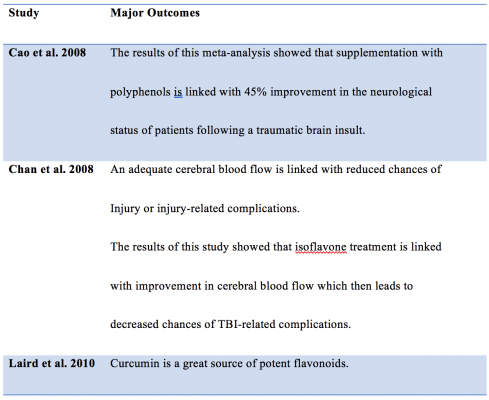
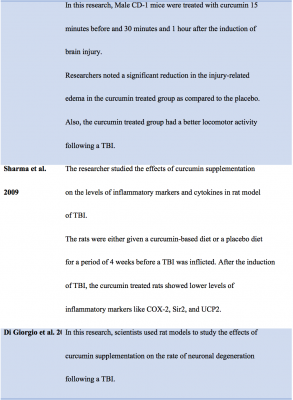
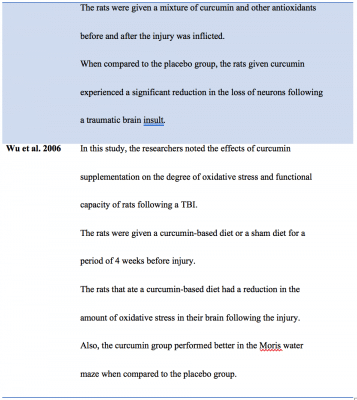
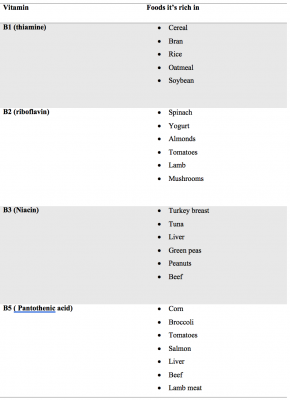
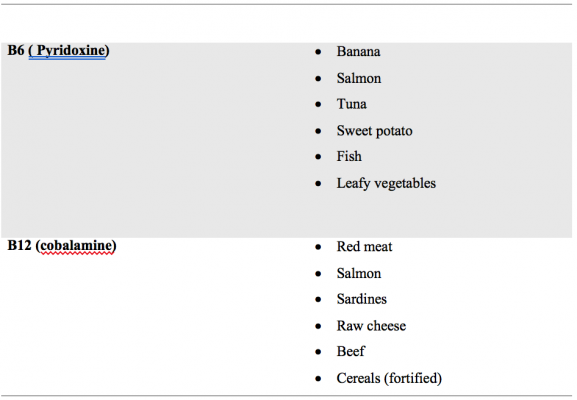
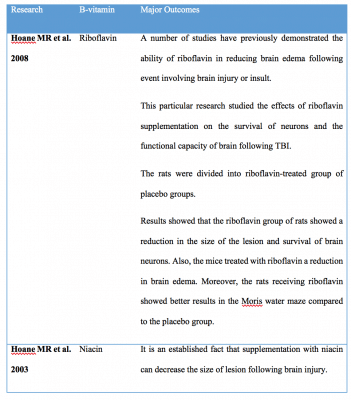
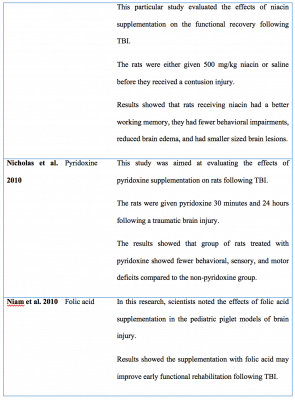



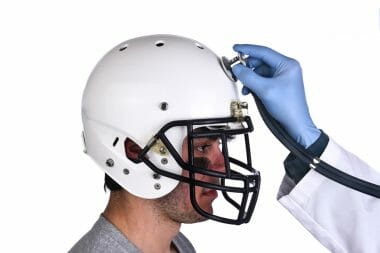
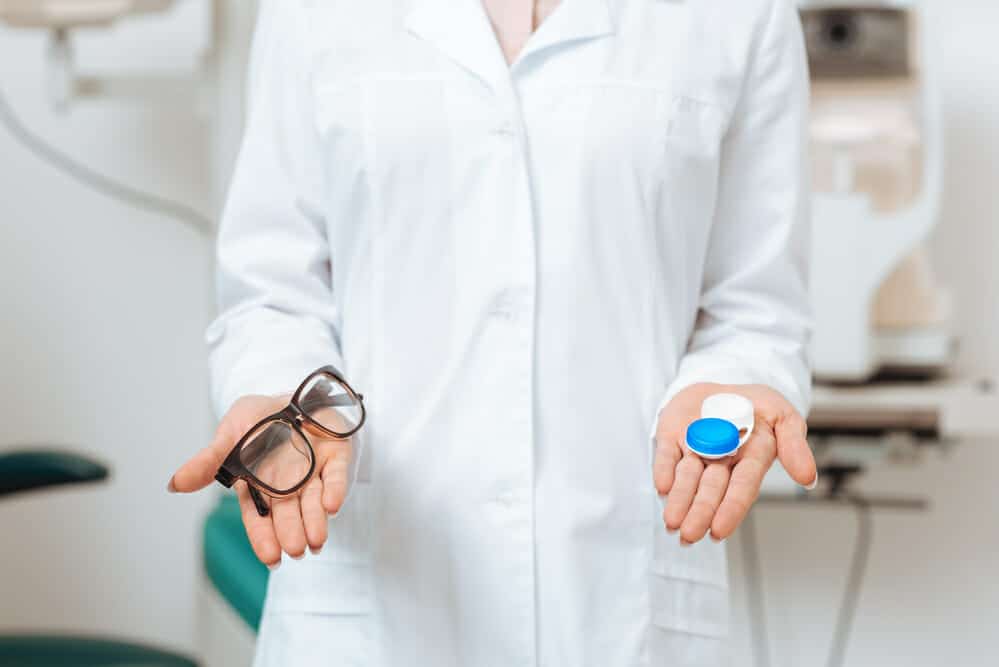
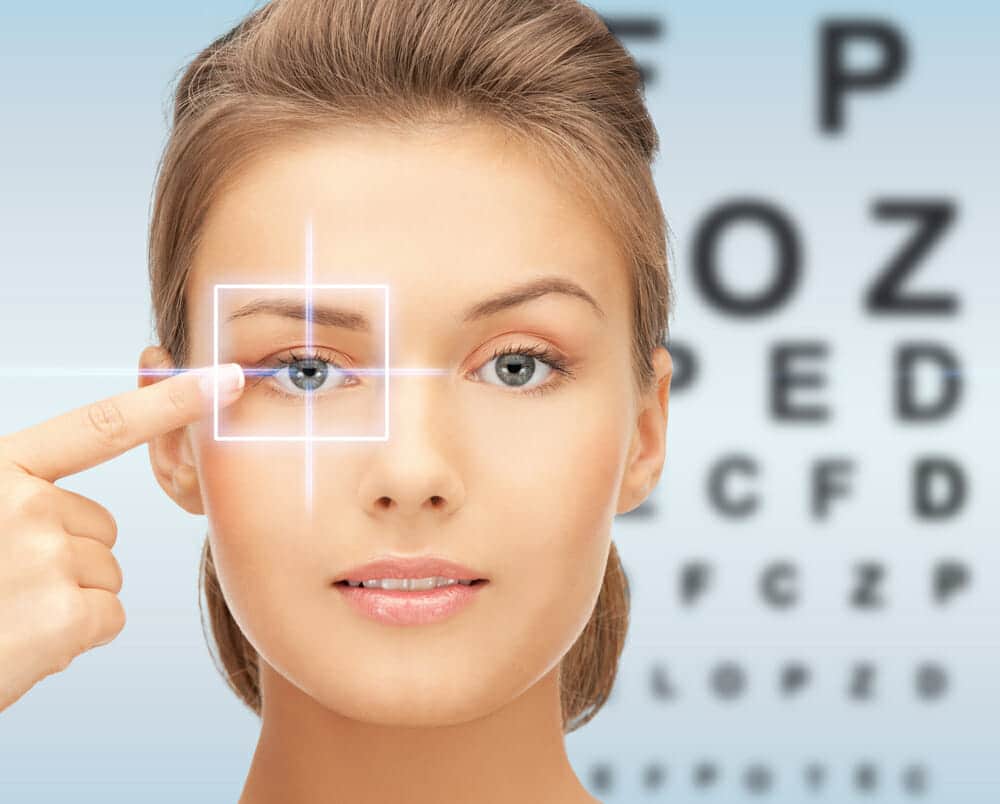
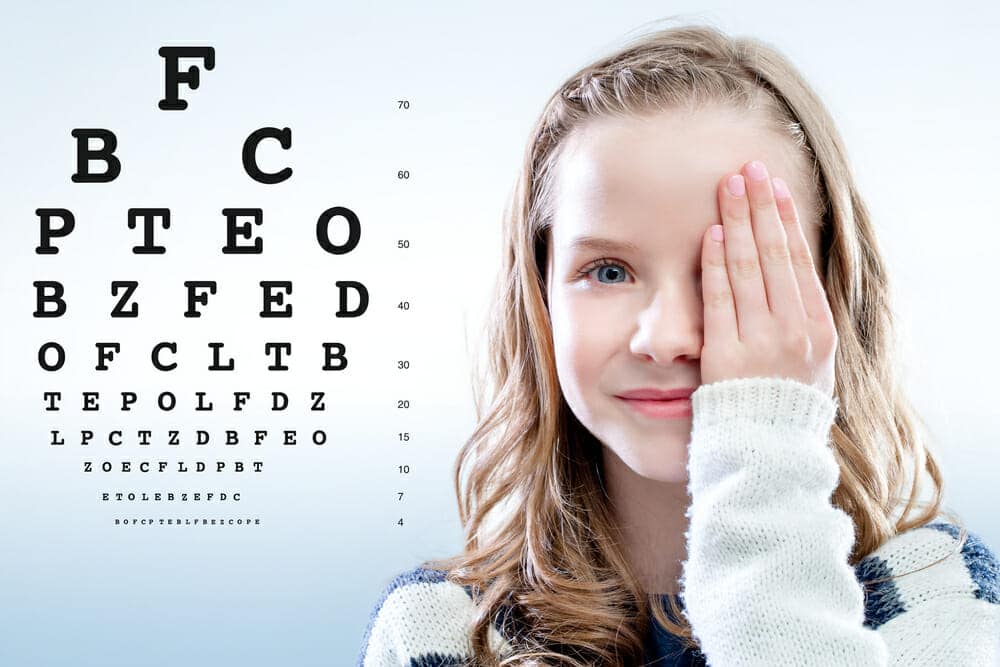
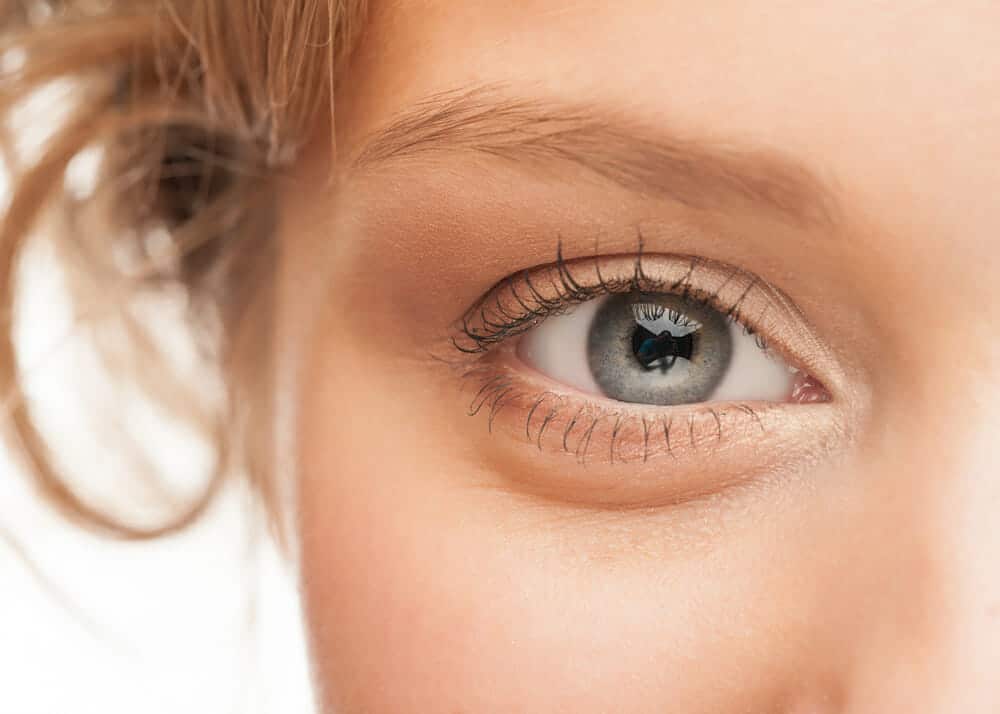
Reply